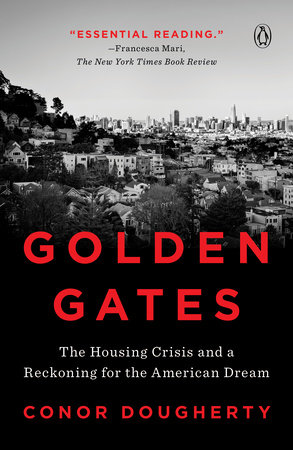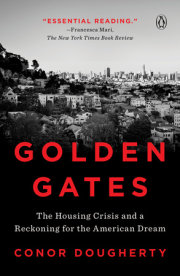Chapter 1
Members of the Public
The political revolution known as BARF began during a seven-hour-and-fifty-two-minute planning meeting inside San Francisco City Hall. It was half a century in the making and in the space of two years would upend California politics and help to spawn a national uprising of angry, millennial-aged renters. But there on that first day you almost had to squint to see it. The meeting was in the judicial-looking chambers of the San Francisco Planning Commission, and it had been going for about three and a half hours when the commissioners turned their attention to a proposal for a new building that would have eighty-three subsidized apartments reserved for low-income households in the impoverished Tenderloin neighborhood. When it was time for public comment, a nervous young woman in a striped sweater and shorts walked from her seat to the audience microphone and addressed the semicircle of commissioners sitting on the platform in front of her.
"Hi, my name is Sonja Trauss," she said. "I'm just a member of the public, and I'm here because there is a housing shortage in San Francisco. And, um, I look forward to as much new housing being brought to market at all levels, uhh, as possible. I mean, quickly as possible. Thanks."
Whoever this Sonja was, she was obviously not alone. Over the next hour, she and a bearded friend kept using the public comment time to say they were in favor of every project in the pipeline, as well as more housing generally. It began with the 83 subsidized apartments in the Tenderloin, then continued with the 111 units at 650 Indiana Street and the 259 units at 1201 Tennessee. Through hastily prepared comments that she strung together with a surplus of "ums" and "sos," Sonja proceeded to lay out a platform that would make her a housing celebrity and inspire a run for city office: how expensive new housing today would become affordable old housing tomorrow, how San Francisco was blowing its chance to harness the energy of an economic boom to mass-build housing that generations of residents could use. She wasn't there to complain about shadows over her yard or a lack of parking on her street. She didn't care if a proposal was for apartments or condominiums or how much money its future residents had. It was a universal platform of more. Sonja was for anything and everything, so long as it was built tall and fast and had people living in it.
"I decided to come speak in support of large housing projects when I realized that the entitlement process is biased against beneficiaries of new building," she told the commission when the Indiana Street project was up. "So neighbors around the projects, with valuable opinions, um, you know, get notified, but the potential probably two hundred new residents have no way of giving input into whether, like, this project or any similar project gets to be built. . . . Sooooo, I'm part of the general community of renters in the Bay Area, so I'm affected by the lack of housing through high rent and lack of options, so I'm here on behalf of myself as, like, a general part of the public. So yeah, so, in general, I'm here to remind the planning commission to consider all the people that will benefit from this once it's built. Because they don't exist yet as, you know, as renters."
The rhetoric wasn't new. The term "NIMBY," developer shorthand for "not in my backyard," had been around for at least four decades at that point, and there were numerous books, countless news articles, and an entire sub-specialty of economics to show that the Bay Area was the national capital of NIMBYism. Had she been a man with white hair or identified herself as the employee of a real estate developer, chances are nobody would have noticed. But for a young adult with no obvious signs of intoxication to show up at a midday city meeting to say she was just generally in favor of housing because San Francisco didn't have enough of it? That made no sense.
Nobody attended eight-hour city meetings if they didn't have to, and while the planning commission was a place of arguments and strange behavior, it was also a place where people at least knew where each other's lanes were. The people who showed up to speak in favor of new projects were the developers who'd proposed them, the trade organizations they paid to shill for them, the unions who worked for them, and the community organizations whose wheels they had successfully greased. The people who showed up to oppose new projects consisted of environmentalists, angry neighbors, and community organizations that felt their wheels hadn't been greased enough. Sonja claimed to be none of these-"just a member of the public."
After the meeting, people walked up to her in the marble hallway to try to figure out if someone had sent her. What's your name? Sonja. What do you do? I'm a high school math teacher. What brought you here today? I'm just a member of the public. The sorts of people who were usually against things asked Sonja questions that were designed to figure out which developer she secretly worked for. The developers she secretly didn't work for tried to figure out if the opposition had recruited her as a reverse-psychology trick. Whichever side they were on, bystanders wanted to know where she had come from and if she had a hidden angle.
Sonja was a grad school dropout who had moved to the Bay Area because she was too embarrassed to move home. She was originally from Philadelphia and ended up in California after bailing out of the economics PhD program at Washington University in St. Louis. Technically speaking, she'd left with a master's, but school had not gone well, and because she was too proud to go back to Philadelphia after telling all her friends that she was off to become Dr. Sonja Trauss, she continued west to El Cerrito, a few miles north of Berkeley, to help her dad's cousin Myrna while she went through chemotherapy. It seemed like a good thing to do for family while she figured out what to do with herself, although that figuring was a lot easier when you had someone you could stay with. After Myrna's treatment, when Sonja went looking for work and an apartment, she joined the long line of people who'd discovered that the Bay Area was an easy place to get a job and an impossible place to afford rent. She and two friends got a West Oakland apartment that cost $3,000 a month, and Sonja started teaching math at a pair of across-the-bay community colleges for $20 an hour, before quitting to make $10.50 an hour at a nearby bakery that didn't involve commuting. It made sense: once she subtracted the cost of all the buses, trains, and ferries that sat between her place and the two teaching jobs, the bakery's take-home pay was the same. It was also depressing: working the night shift twisting pretzel dough was not what she'd expected to be doing at thirty.
She'd never really had it together in the career department. Sonja graduated from Temple with a philosophy degree, then went to law school and dropped out. Later came the economist phase that sent her to the Midwest before she left. She'd been a bike messenger, a window washer, and a legal aide. She worked at a neighborhood association and answered the phones at a mortgage hotline in the throes of the financial crisis. Sonja liked reading and school, and her mom was a nurse and her dad was a lawyer, so the professional expectation was there. She just could never throw herself into the pursuit of a real job or credential the way she could so totally throw herself into the new hobbies and activist side projects she picked up whenever some problem or perceived injustice appeared along the way.
This had started early. In seventh grade Sonja got sent to detention after she and a friend persuaded their science class to be dead silent for an entire class period to punish the teacher for telling the class to shut up. No questions, no greetings, nothing but eerie preteen stares for forty-five straight minutes. She'd been arrested for protesting a city plan to renovate a popular park so that it wouldn't be so attractive to skateboarders, and later spent a year organizing friends and sewing spandex costumes as part of the founding of a thirty-person comedy troupe, the the Vaudevillains, that marched in the New Year's Mummers Parade. When the owner of a printing press across the street from her house in Philly started operating at all hours, Sonja turned it into a months-long war that began with a noise complaint to the city, escalated to more complaints about the city's lack of responsiveness, and ended after she started calling the owner of the printing press's cell phone and leaving messages that consisted of nothing but the sound of his press in the background while she held the phone out of her bedroom window, then kept calling, over and over, until the voice mail ran out of space and the owner asked a judge for a restraining order.
In Philly, you could afford to be a marginally employed rabble-rouser because everything was cheap. Sonja had a cheap four-bedroom house that had open walls with exposed wiring, and she packed it with cheap artist and musician roommates who turned the place into a subcultural melting pot of punks, rappers, artists, zinesters, graffiti writers, Hollertronix DJs, and grad students. Years later, the people who lived and hung out there would describe it with strange vignettes, like how Spank Rock and Santigold once filmed a music video in the living room, or how there was this one period when Sonja got really into weight lifting and another when she was all about role-playing games, and how on occasion these interests would overlap and one day you'd come home and find her in a circle with a bunch of buff dudes drinking protein shakes while playing Call of Cthulhu. Bargain rent was the backdrop, the freedom that brought these scenes into existence. And it was 180 the experience of the Bay Area, where art seemed to be defined by political activism and the struggle of just being there.
This was never more true than it was during one of the region's periodic tech booms. During the late 1990s dot-com boom, a group called the Mission Yuppie Eradication Project started encouraging residents of San Francisco's Mission District to vandalize parked SUVs on the logic that this would prompt young professionals to move to neighborhoods where their cars were safer (and the restaurants who catered to them to go out of business). Two decades later, when Sonja arrived at the beginning of a new boom tied to smartphones and social media, the yuppies had traded their SUVs for Ubers, so activists had instead taken to spray-painting the sidewalks with phrases like "Tech Scum" in nicely stenciled lettering. Things started escalating in 2013, when a group calling itself Heart of the City descended on the annual Pride Parade with a white bus emblazoned with a banner that read "Gentrification & Eviction Technologies OUT" (GET OUT) in Google font and coloring. Later that year, on December 9, 2013, the same group created a human blockade that prevented one of Google's employees-only shuttle buses from leaving a stop in the Mission en route to the company's headquarters, which sat thirty-five traffic-choked miles away in the Silicon Valley city of Mountain View.
Anyone in search of a meme-ready example of the "barbell economy"-bulges of rich and poor separated by a rail of middle class-would have a hard time doing better than the Bay Area tech buses. They were hulking double-deckers with velvety seats and fast Wi-Fi and tinted windows to hide the private lives of software geeks. It wasn't just that tech jobs paid well and came with a ride to work. They had good health care and free lunch and gyms and laundry, and the people who got them were "talent." The spectacle of a bus full of talent being protested by several dozen people holding signs that said things like "Stop Evictions Now" and "Warning: Two Tier System" seemed to encapsulate America's vastly more unequal direction, and within a few hours the story, which had been heavily chronicled on Twitter, was splashed on newspaper home pages around the world.
Sonja was plenty bothered by rising rents but had a different view on what the problem was. Having spent most of her life in Philadelphia, a city with blocks of empty property that had lost about half a million people from its 1950 peak, she knew what a troubled city looked like and was not going to blame anyone for moving to a region that to an outsider felt like an economic wonderland. It had been only a few years since the Great Recession. Most of America was still grappling with what the pundits called "a jobless recovery" (whatever that meant), while the Bay Area lived in a bubble of exuberance and self-satisfaction. Google had just revealed its self-driving car project, Facebook was gearing up to go public, and the venture capitalist Marc Andreessen was coining the phrase "software is eating the world." Sonja thought it was exciting to live in a place with so much optimism and easy employment, and when she heard people complain about how San Francisco was being murdered by runaway growth, she regarded them as ingrates who didn't know or didn't care what places like Philly and St. Louis looked like.
So, no, the problem was not too many jobs, which is fundamentally what the tech protests were about. The problem, as Sonja saw it, was too little housing. She was two years removed from economics school. The law of supply and demand was still fresh in her mind. She'd also found it shocking just how flat Bay Area cities seemed to be given how much it cost to live there. There were some skyscrapers and a few Parisian-height neighborhoods around the core of San Francisco and Oakland, but most of the rest was single-family houses, and the region's two major commuter rail lines, Bay Area Rapid Transit (BART) and Caltrain, were surrounded by empty fields and sprawl of the sort Northern Californians supposedly scoffed at LA and Orange County for. The mythical Silicon Valley, charter of America's future, was a land of unremarkable cul-de-sacs with unremarkable $2 million houses, surrounded by a bunch of office parks and strip malls that could be mistaken for the suburbs of Phoenix. And yet seemingly anytime someone talked about building a duplex or triplex, let alone a five- or six-story building, it was tarred for having too many shadows or being "out of character."
Copyright © 2020 by Conor Dougherty. All rights reserved. No part of this excerpt may be reproduced or reprinted without permission in writing from the publisher.










